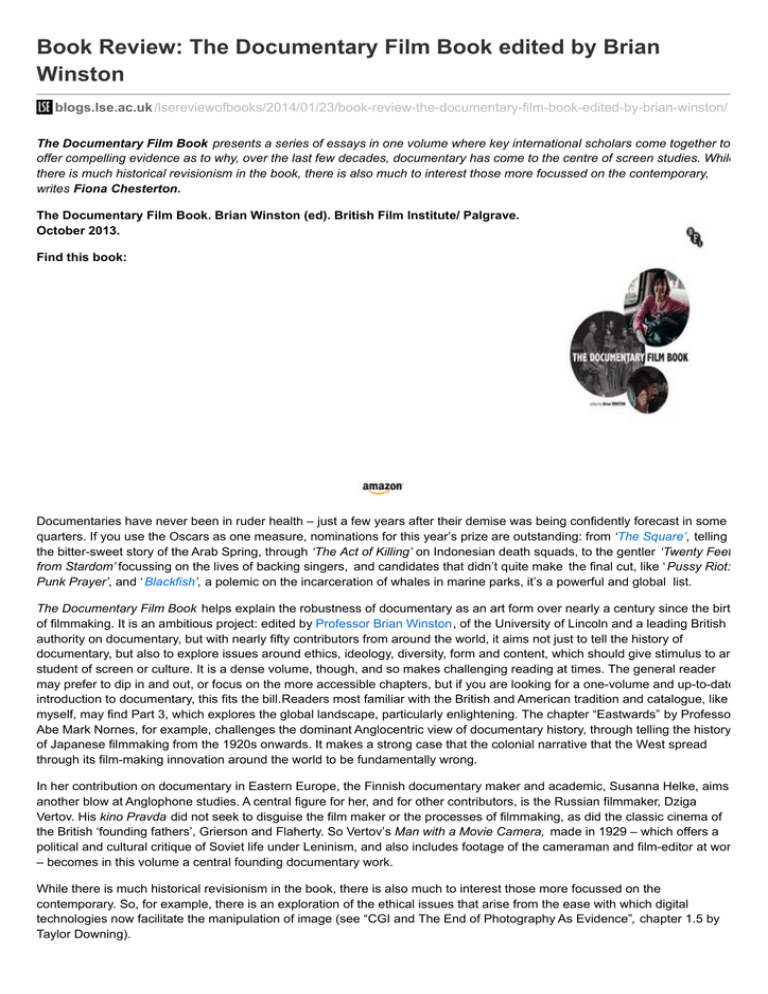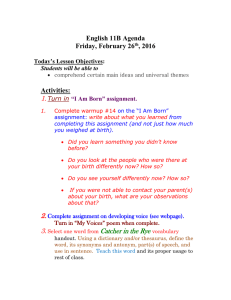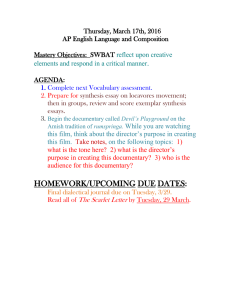Book Review: The Documentary Film Book edited by Brian Winston
advertisement

Book Review: The Documentary Film Book edited by Brian Winston blogs.lse.ac.uk /lsereviewofbooks/2014/01/23/book-review-the-documentary-film-book-edited-by-brian-winston/ The Documentary Film Book presents a series of essays in one volume where key international scholars come together to offer compelling evidence as to why, over the last few decades, documentary has come to the centre of screen studies. While there is much historical revisionism in the book, there is also much to interest those more focussed on the contemporary, writes Fiona Chesterton. The Documentary Film Book. Brian Winston (ed). British Film Institute/ Palgrave. October 2013. Find this book: Documentaries have never been in ruder health – just a few years after their demise was being confidently forecast in some quarters. If you use the Oscars as one measure, nominations for this year’s prize are outstanding: from ‘The Square’, telling the bitter-sweet story of the Arab Spring, through ‘The Act of Killing’ on Indonesian death squads, to the gentler ‘Twenty Feet from Stardom’ focussing on the lives of backing singers, and candidates that didn’t quite make the final cut, like ‘ Pussy Riot: a Punk Prayer’, and ‘ Blackfish’, a polemic on the incarceration of whales in marine parks, it’s a powerful and global list. The Documentary Film Book helps explain the robustness of documentary as an art form over nearly a century since the birth of filmmaking. It is an ambitious project: edited by Professor Brian Winston, of the University of Lincoln and a leading British authority on documentary, but with nearly fifty contributors from around the world, it aims not just to tell the history of documentary, but also to explore issues around ethics, ideology, diversity, form and content, which should give stimulus to any student of screen or culture. It is a dense volume, though, and so makes challenging reading at times. The general reader may prefer to dip in and out, or focus on the more accessible chapters, but if you are looking for a one-volume and up-to-date introduction to documentary, this fits the bill.Readers most familiar with the British and American tradition and catalogue, like myself, may find Part 3, which explores the global landscape, particularly enlightening. The chapter “Eastwards” by Professor Abe Mark Nornes, for example, challenges the dominant Anglocentric view of documentary history, through telling the history of Japanese filmmaking from the 1920s onwards. It makes a strong case that the colonial narrative that the West spread through its film-making innovation around the world to be fundamentally wrong. In her contribution on documentary in Eastern Europe, the Finnish documentary maker and academic, Susanna Helke, aims another blow at Anglophone studies. A central figure for her, and for other contributors, is the Russian filmmaker, Dziga Vertov. His kino Pravda did not seek to disguise the film maker or the processes of filmmaking, as did the classic cinema of the British ‘founding fathers’, Grierson and Flaherty. So Vertov’s Man with a Movie Camera, made in 1929 – which offers a political and cultural critique of Soviet life under Leninism, and also includes footage of the cameraman and film-editor at work – becomes in this volume a central founding documentary work. While there is much historical revisionism in the book, there is also much to interest those more focussed on the contemporary. So, for example, there is an exploration of the ethical issues that arise from the ease with which digital technologies now facilitate the manipulation of image (see “CGI and The End of Photography As Evidence”, chapter 1.5 by Taylor Downing). Credit: margaretkilljoy. CC BY-NC-SA 2.0 There is also much about what some would see as the subversion, rather than the popularisation, of documentary, by television. So contributor Richard Kilborn, of the University of Stirling, reminds us about the invention of the Docusoap in the 1990s. This featured so-called ordinary people in familiar but potentially entertaining situations – such as learning to drive (Driving School), or making ‘characters’ of people at work, such as Jeremy in Airport. This foreshadowed the rise of the pure entertainment formats that followed which made celebrities of ‘ordinary’ people. As Kilborn points out, these formats were an antidote to the earlier – more serious in purpose – Griersonian social affairs programmes, which tended to see their subjects as victims – and which certainly attracted smaller audiences. Twenty years on, the arguments still rage as to the use – or abuse – of ordinary people in real-life programmes on prime time TV – the latest being Channel Four’s Benefits Street. Exploitation of working class people by middle Class TV producers for TV entertainment and social media vilification? – or an on-the-button foregrounding of the most controversial of current issues through documentary ? The Documentary Film Book provides the student with much historical context to help him or her come to their own answer. It also gives a comprehensive view of the whole horizon of screen studies – including a final section, considering the exciting and radical possibilities of interactive and collaborative documentary- making enabled by digital and social media. I would have liked to see some more focus on editing, as opposed to camerawork and direction, but editors have, alas, invariably had less attention. There could, perhaps, have been a chapter on another new documentary form, using fixed rig cameras, where the craft – and all the peril- is in the editing. Series like 24 Hours in A&E and Educating Essex can film their subjects discreetly and over an extended period, but largely transfer the story-making and the power to the producer and commissioner in the edit-suite. Again and again, both the contemporary and historic debates come down to the difficult, if not intractable, questions of how to capture reality on screen. One person’s reality is another’s fiction. The subject’s or the author’s reality? The personal or the political? The political as the personal? When was the Golden Age or are we living through it? That roll-call of Oscar nominees gives us cause for hope that the documentary form has got a lot of life – and hope – in it yet. The Documentary Film Book provides much more than a primer for a thousand student essays and debates amongst film-makers. ———————————Fiona Chesterton worked as a Producer, Editor, and Commissioning Editor at the BBC and at Channel 4, primarily in News and Current Affairs. She was made a Fellow of the Royal Television Society in 2008. Read more reviews by Fiona .



